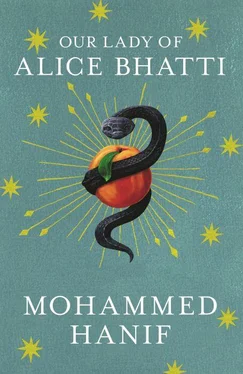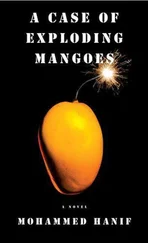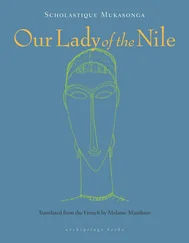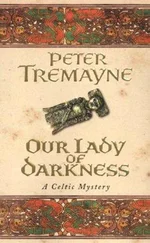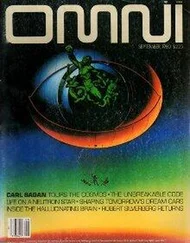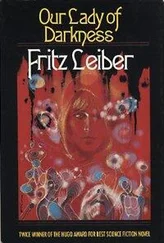The sweeper just has to go out and mention it to an ambulance driver whose wife has had three miscarriages, and the news start spreading like a riot, because once it starts, it finds its own momentum and travels through lapsed believers who have been waiting for a sign, and then it reaches the really needy ones who can’t afford to lose hope. Soon it isn’t just the dead babies who are getting a second chance at the Sacred. According to the rumours, there are miraculous cures for advanced diabetes, and pancreatic cancer heals itself if you manage to get past the OPD. Some obese people are seen hobbling around the courtyard hoping to burn all their fat overnight.
In the all-pervasive mood of hyper-optimism, people either don’t find out or choose to ignore two basic facts: the mother of the baby quietly passed away while Alice was praying to save the baby, and the miracle-maker is a lapsed soldier of Yassoo but still a Catholic, a woman, and a junior nurse. Although the Catholic Church had adopted a number of borderline pagan habits, falling into the local customs of burning incense at the mention of anything holy and covering every slab of marble that carried a saint’s name with garlands of marigold, it had never allowed a female member of its congregation any role that didn’t involve carrying a bowl of holy water, washing the dead or preparing the native cuisine for visiting clergy: Goan prawn curries for foreign bishops and aloo gosht for common priests from Punjab. The Catholic Church hears these rumours but ignores them, as for decades it ignored rumours about her father Joseph Bhatti’s ulcer cures.
Alice Bhatti is so busy that sometimes she forgets the little baby that she allegedly saved. Nobody turns up to claim the mother’s body and it gets the usual quiet burial after a seven-day wait. Alice Bhatti is living out of her bag. Sometimes it seems to her that the seven thousand patients in the hospital, hundreds crawling in the corridor, thousands more out in the compound using bricks as pillows, are feeling a bit better because they are in the hospital compound, only a few metres away from operating theatres, labs and drug dispensaries. But really they are here to seek the Bhatti cure. They have heard the tales about dead kids coming alive, the old no-hoper cancer patients going home on their own feet. They are here to seek her intervention. There are long queues whenever she is on shift.
Alice Bhatti knows that after the freak incident with the baby, the other so-called miracles are mostly the result of a non-literal implementation of the working nurse’s manual, sometimes applied with a bit of inspired improvisation, half a Prozac added there, an antibiotic deleted from another prescription, but mostly a generous helping of disinfectant, constantly boiling pots for syringes and needles across the hospital, fresh cotton and gauze, bleach in the sinks and bathrooms. Not that her fellow paramedics cared at the beginning. They were happy to get some positive press and gave her all the industrial-strength chemicals she wanted.
“What miracle?” In the beginning they would laugh when people started turning up. “Anyone getting out alive from this hospital? Yes, that is definitely a miracle.”
Sister Hina Alvi walks in with a new junior nurse in tow cradling the baby, whom everyone still refers to as the dead baby. The baby is covered in a new pink blanket, its head shaved, its cheeks already beginning to fill out. “How is our God’s little healer coping?” Hina Alvi is the only one who isn’t impressed. “I hope you haven’t begun to believe all this nonsense.”
Alice comes forward, takes the baby from the nurse’s hands and starts rocking it. “People will believe what they want to believe. I am only doing my job.”
Alice Bhatti means to sound modest, but her statement comes out as grand.
“Well I guess if they say it’s a miracle, we can’t mess with them. I don’t know what this world is coming to,” says Hina Alvi. “As a child I was taught that God is in everything. I thought that this concept was so simple that even someone like me could understand it. Now that I am getting old, they want me to literally see God in vegetables. For the last five years, every year there is an aubergine somewhere that, when you slice it, it has the word Allah running through it. I am sure if you slice it the other way you can see your own husband’s face and if you move it sideways you can read something obscene. There is always a cloud shaped like Muhammad. I know some people see Yassoo on a cross or his mother in a pretty dress in every seasonal fruit. Why do people need that kind of evidence? Isn’t there always a flood or an earthquake or a child run over by a speeding car driven by another child to remind us that God exists?”
Alice Bhatti is looking at the baby, not really paying much attention to Hina Alvi’s rant about miracles. “What have you heard?” she asks her, because she doesn’t really know what is going on in the outside world. She has let people kiss her hands but refused to let them touch her feet.
“I have heard all kinds of stupid things. I have heard that Alice appears at people’s bedsides in the middle of the night when she is not even on duty, when she is not even in the hospital, when she is probably fast asleep in her bed. I have heard that when she is on duty, bedpans disappear and reappear cleaned and polished. I have heard that IVs self-adjust, I have heard strangers turn up offering A-negative, free of cost. I have heard that Dr Pereira is thinking of starting his old band again. And making gospel music. All I want to say is, stop with the miracles and stick to your day job. This miracle business is strictly a seasonal thing. You have seen those ice-candy vendors who come out in July? Do you ever see them any other month of the year?”
Alice Bhatti has actually been yearning to go back to her boring job. Because she has already started getting returns; people who are cured one day come back the next day with a new malaise. She already knows that her miracles are turning out to be her curse, like a prophet who brings the dead back to life, and then those brought back complain that they’ve come back to the same old life. It is turning out to be like the time spent with her fellow inmates in the Borstal, whose loneliness she tried to cure with aspirins and long talks about the wonders of human anatomy and jokes about doctors. They always came back the next morning looking even more lost.
“Do you think you are doing God’s work?” Hina Alvi asks her. “Because I know that God’s work is done not through prayers and not through kissing hands. You have to get your hands dirty.”
The baby has gone to sleep. He feels weightless in Alice Bhatti’s arms. She presses him against her stomach.
“He makes us sick. He cures. I am only doing my duty.”
“Look, what you did there was OK, not your fault. These people will get bored very soon and find another messiah, somebody who cures their cancer but in the process also doubles their money. So the real miracle would be if we don’t leave this child to become rat food.”
“I was thinking of taking him home with me.” Alice Bhatti has been thinking about a baby, but not this baby, since she found out about her pregnancy. But in this moment it sounds like the right thing to say, and having said it, it seems like the right thing to do, the only thing to do.
“You were thinking of taking him home? Is that why you haven’t gone home for three nights? Is that why you have been sleeping in Noor’s bunk? Do you even have a home any more? Or have you somehow made your husband disappear? Now that would be a miracle.”
The baby stirs in his sleep and punches the air in slow motion with his tiny clenched fists. “You know what it has been like. It’s impossible to walk out of that gate,” says Alice.
Читать дальше
